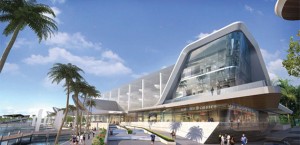Miami city officials could be headed back to the drawing board with their plans to redevelop the Rickenbacker and Marine Stadium marinas on Virginia Key.
On Wednesday, the Miami City Commission ended a three-hour-plus special hearing without making a decision about whether or not to begin lease negotiations with the winning bidder, RCI Group, the company that operates the Miami Beach Marina at 300 Alton Road. Commissioners may take the issue up again their regular meeting on Thursday.
While the firms that finished in second and third place attempted to disqualify RCI, commissioner Ken Russell expressed his desire to start over with a new request for proposals that affords Miami residents more input on what can be developed on Virginia Key.
“All three brought forward really cool plans that can be great,” Russell said. “But I can guarantee you nothing we come up with here to move forward will be acceptable to the public. And not one single person who came up to speak at the podium said this is a great plan.”
On the line is a 75-year contract that would still require voter approval. Miami City Manager Daniel Alonso is recommending city commissioners allow him to begin negotiating terms with RCI, which submitted a $100 million proposal that was ranked ahead of competitors Suntex and Tifon Miami by an evaluation committee. RCI is proposing to tear down a majority of the existing structures on the 10-acre site to build a retail and restaurant destination called Virginia Key Harbour & Marine Center. The company is partnering with Arquitectonica and Pininfarina to build the complex.

RCI Group rendering
The project would entail an oblong, two-story building, a public baywalk, new boat slips in the basin, and a dry-storage boat facility that would use an automated system to retrieve vessels instead of fork lifts. By the tenth year of the deal, when the last phase is expected to be completed, RCI estimates it will net $6.7 million in profits yearly and pay the city $4 million in annual rent.
The marina projects are separate from the $24 million the city recently invested in renovating a surface parking lot outside Marine Stadium into a flex park and event space that served as the new home of the Miami International Boat Show earlier this year.
During the city commission meeting, City Attorney Victoria Mendez opined that third-place Tifon had no standing to protest the decision to go with RCI. She also said that Dallas-based Suntex, which finished second, had failed to show why RCI should be disqualified.
Suntex offered an $84 million project consisting of more than 1,300 dry and wet slips, a yacht club, Fresh Market and a 30,000-square-foot Marine Max showroom. Tifón, a partnership involving an Argentinian marina developer, Fortune International Realty President Walter DeFortuna and current Rickenbacker Marina operator Aabad Melwani, wants to build a $70 million complex with 100,000 square feet of retail, three restaurants, and an automated dry stack system similar to RCI’s.
Attorneys for Suntex tried to convince commissioners to eliminate RCI by making accusations of unfair scoring by evaluation committee members, RCI being unable to financially deliver the project, and an alleged conflict of interest involving Daniel Rotenberg, Miami’s real estate and asset management director. Rotenberg is a former principal of Tate Capital, a firm that partnered with RCI to develop the Bahia Mar Marina in Fort Lauderdale.
But residents were more interested in seeing the city commission throw out all the bids because none conformed to the Virginia Key master plan. “Whoever put this RFP together never knew there was a master plan,” said Barbara Lange.
Added Dolly MacIntyre, Dade Heritage Trust secretary: “You must throw out this RFP. It is flawed from A to Z.”
